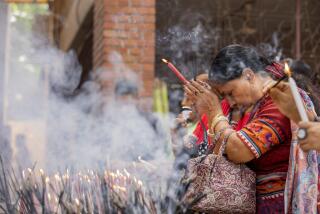Strict Islamic Law Raises Fears of Women : Bangladesh: Rapist goes unpunished; accuser is lashed for having unlawful sex. As imams apply their interpretations of the ancient codes, known as the Sharia, victims become outcasts.
- Share via
BAKSHIPARA, Bangladesh — When Islamic clerics set up a village “court,” Saher Banu thought she would see punishment of a man accused of raping her daughter. She was wrong.
Instead of convicting the man, the 13 priests sentenced the daughter to 80 lashes with a supple bamboo cane for having unlawful sex.
Hazera Begum, 20, passed out after receiving 35 blows. The trial and punishment were witnessed by about 200 people, including women and children.
The self-appointed court found her guilty because she could not produce three male witnesses to support her allegation that she was raped one day when she went to the fields to pick vegetables.
Such courts have no legal standing, but their punishments are carried out. Fundamentalists are growing increasingly assertive in Bangladesh, where 90% of the people are Muslims.
Bangladesh’s civil code is based on laws inherited from the British, who ruled the Indian subcontinent until 1947. But local imams--acting on their own when they hear of misconduct--are applying their interpretations of the ancient codes of Islam, the Sharia.
In remote villages, where most people are illiterate, clerics have far more influence than the police or judiciary.
Women’s rights groups say at least 48 women have died in recent years after being convicted of violating the Sharia. Most killed themselves because they could not bear the humiliation.
“It is difficult to get a clear picture because many incidents occur in remote villages and the victims do not report to police for fear of reprisals,” said Ayesha Khanam, a women’s rights activist.
Women accused of adultery are not the only victims. Clerics also have targeted voluntary agencies that promote literacy, health care and family planning--causes that fundamentalists say undermine the traditional role of women.
Last year, about 1,400 schools for women were vandalized. Women working for voluntary agencies were declared social outcasts in their villages.
Husbands were forced to divorce their wives if they received money or health care from the agencies. Under religious law--which is not recognized by civil authorities--a man need only tell his wife three times, “I divorce you.”
A popular feminist author who wrote about these problems, Taslima Nasrin, fled into exile last summer after receiving death threats for criticizing Islamic laws.
“Bangladesh is a Muslim country and its laws must be based on Sharia (Islamic law). There is nothing wrong in it,” said Islamic leader Fazlul Huq Amini.
The clash has sharpened with women’s groups taking to the streets to demand punishment for clerics who participate in kangaroo courts.
Prime Minister Khaleda Zia’s government is wary of outraging the clergy because they influence rural votes. But it has begun to act on women’s complaints.
After Hazera’s story appeared in newspapers, the Home Ministry ordered the arrest of the clerics who were involved in her caning in October in the farming village of Bakshipara, 150 miles north of Dhaka, the capital.
Banu recalls the horror of the so-called trial. “I begged each of them to save my daughter. I could bear no more and collapsed when they pronounced the verdict,” she said.
Eight clerics have been detained and police are looking for five who fled. They face a maximum 14 years in jail under a 1983 law against the repression of women.
Early last year, nine clerics were sentenced to seven years in prison in the case of a woman who killed herself with poison after she was stoned for adultery.
Women’s rights activists say five women were flogged publicly in 1994. Hazera’s was the first case in which arrests were made.
The radicals feel no remorse. “She is a bad girl. We cannot allow her to spoil the men in our ideal village,” said Mahibul Hasan Karim, a cleric who was not on the panel that convicted Hazera.
For Hazera, the torment continues. “Who is going to marry me? I’ve become a social outcast.”
More to Read
Sign up for Essential California
The most important California stories and recommendations in your inbox every morning.
You may occasionally receive promotional content from the Los Angeles Times.













